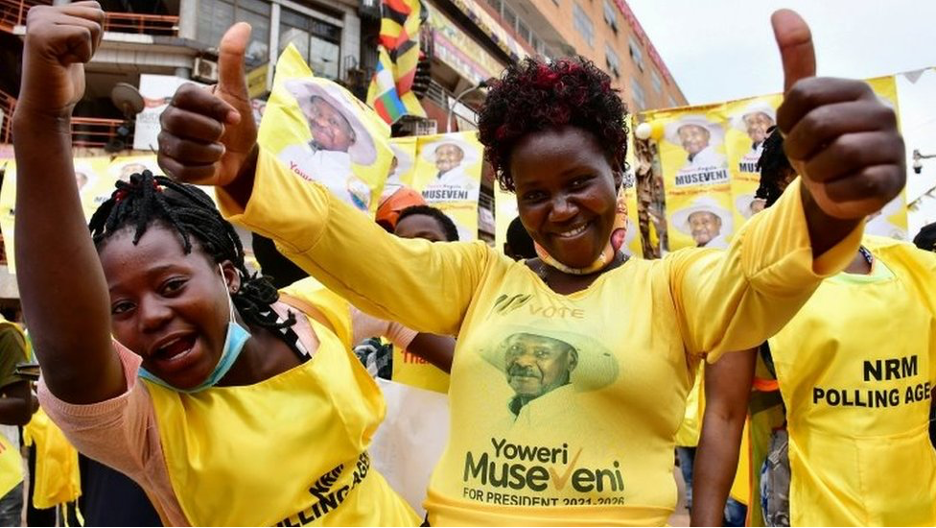
Over Museveni’s 35 years of rule, U.S. Presidents from Reagan to Trump still love him as much as they loved his even more murderous predecessor, Idi Amin, and for the same corrupt reasons
In March 1998, President Bill Clinton went to Africa, where he waxed lyrical about a “new generation” of African leaders supposedly committed to free markets and democracy.
At the top of his list was Uganda’s Yoweri Museveni, whose regime received $20.5 billion in U.S. aid between 1998 and 2013.
On Saturday January 16th 2021, twenty-two years after Clinton’s visit and thirty-five years after he first took power in 1986, Museveni was reelected as Ugandan President despite widespread allegations of massive fraud.
According to official tallies, Museveni received 59 percent of the vote compared to 35 percent for his top challenger, Bobi Wine, a 38-year old pop star whose songs highlight the joblessness and corruption gripping Uganda.
Wine vowed afterwards to provide evidence of fraud when internet connections were restored in Uganda.[1]
Wine had been repeatedly jailed during the campaign for violating coronavirus restriction laws and had his home compound broken into.
Watch, and listen to, Bobi Wine, Uganda’s leading opposition figure,
as he gets pulled from his car by the police
while campaigning. [Source: nytimes.com]
Wine filed a complaint with the International Criminal Court accusing Museveni and his security forces for authorizing a wave of violence and human rights abuses including incitement to murder, citing an assassination attempt against him in 2018.
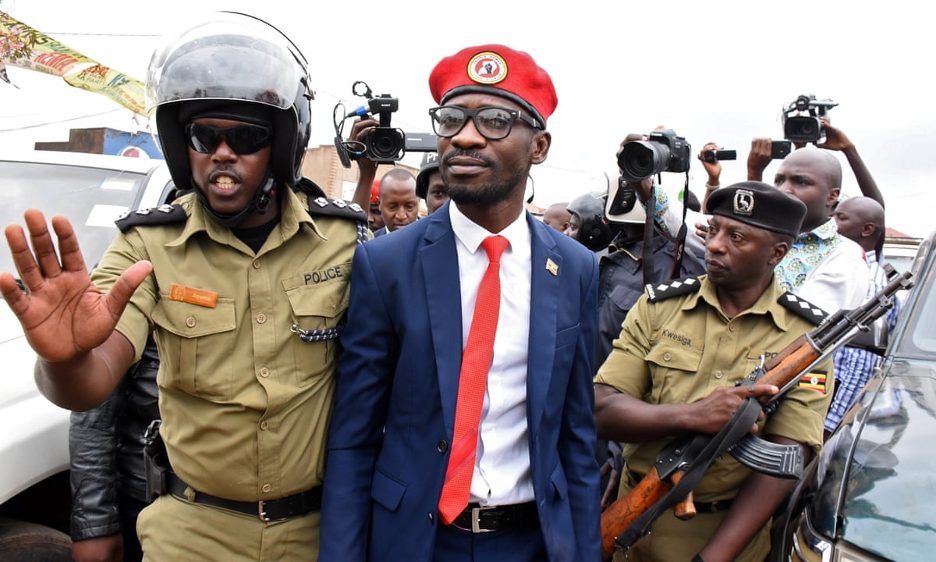
Days before the election, the U.S cancelled its observer mission to Uganda, saying that the majority of its staff had been denied permission to monitor polling sites.[2]
The State Department’s assistant secretary of state for African Affairs, Tibor Nagy, tweeted on Friday after the vote that Uganda’s election was “fundamentally flawed” and that the U.S. was assessing options to respond.
Such statements are undercut, however, by the U.S. aid money—totaling $936 million in 2019—that is unlikely to be cut off.
“The international donors, and particularly the United States, are the biggest enablers of Museveni’s authoritarianism,” said Godber Tumushabe, a Ugandan lawyer and activist. “They underwrite all of Uganda’s public services—health, infrastructure, et cetera—which allows Museveni to spend massively on a security apparatus and a network of patronage.”
Museveni’s Elitist World View Revealed to NPR
In a frank interview that he gave National Public Radio (NPR)’s morning edition days before the election, Museveni attributed Uganda’s problems to a “culture of not working hard,” stating that “in other parts of the world, people are pressured to work either by the environment, which is hostile, or by competition between man and man. But here, fools can survive.”
Taken aback by these statements, NPR’s Africa correspondent Eydar Peralta told Museveni: “That’s a really harsh thing to say to your people.”
Museveni countered: “I’m telling you, just record.”
NPR host Tonya Mosely then piped in that it was amazing that Museveni had not talked at all about issues like “building roads or improving schools.”
When Peralta again said: “I think what you’re saying sounds really condescending toward your people,” Museveni responded: “It’s not condescending. It is a struggle to change a society, which we know well, which, of course, you don’t know very well.”
Peralta went on to ask Museveni about his foreign minister and close aide, Sam Kutesa, whom the FBI found had taken a $500,000 bribe from a Chinese businessman.
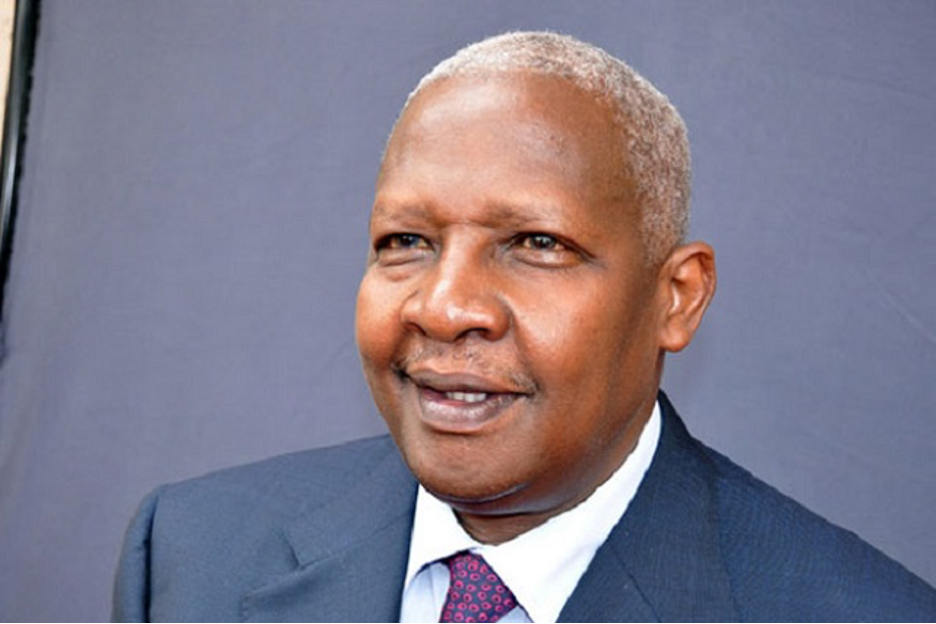
Museveni feigned ignorance, telling Peralta to send him the incriminating documents.
After this exchange, Museveni made a point of driving Peralta around his farm to show him his prized possession—his 10,000 cows.
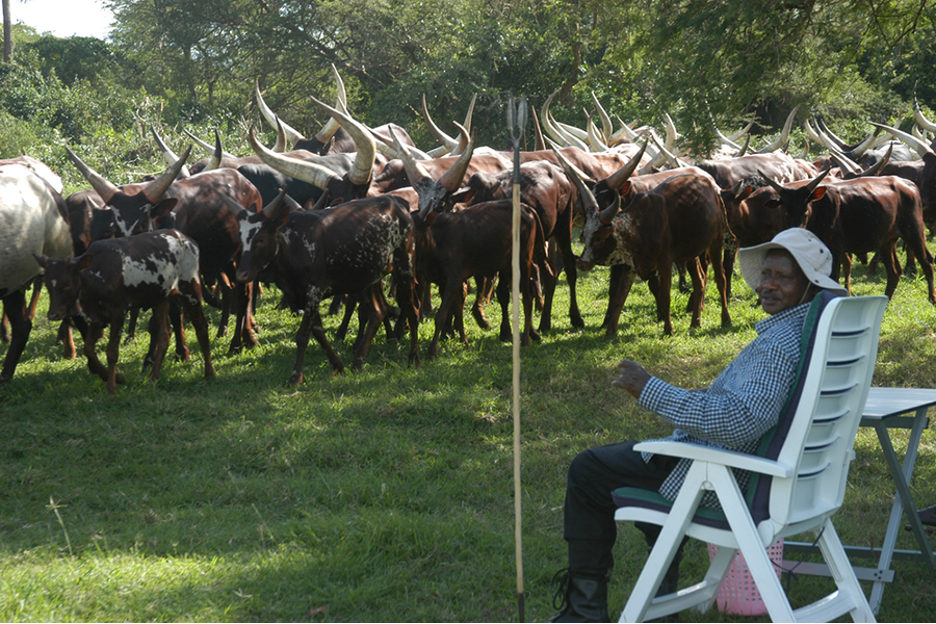
Museveni then tried to explain what made him different from his young opponent, stressing that Bobi Wine was “too focused on the lumpenproletariat or the thoughtless masses.”
Museveni stated: “Because the money, the income generated by the—by us, the farmers, the industrialists that will help the ghetto people.”
Peralta told NPR listeners: “so he’s saying—if you can’t hear it—that it is the rich like him who will help the ghetto people. And this is coming from a man who has 10,000 cows in a country where many people eat meat for special occasions, maybe for Christmas or for Eid.”
Monomania to Rule Over Others
Museveni has come a long way from his days as a Marxist university student at the University of Dar es Salaam in Tanzania in the late 1960s, where his thesis explored Frantz Fanon’s theory that violence could be a cleansing force when committed in the name of revolution.[3]
In the 1980s, Museveni transformed himself into a neoliberal who embraced privatization and the International Monetary Fund (IMF)’s structural adjustment program.
Museveni gained power in 1986 after taking up arms as leader of the National Resistance Movement (NRM) in a six-year bush war that followed from rigged elections.
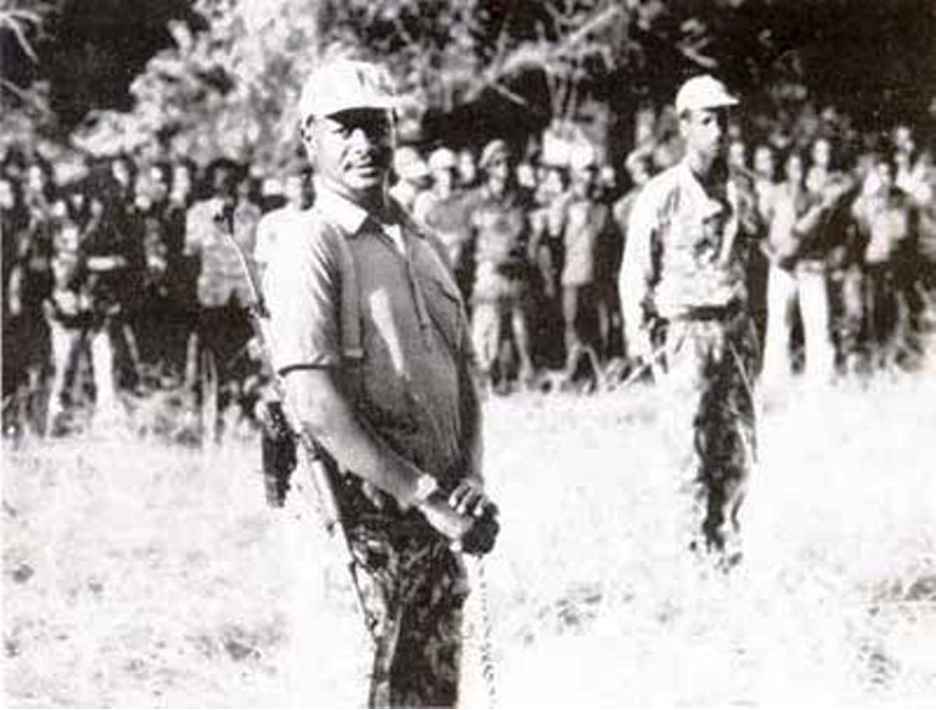
Museveni became particularly skilled in the use of propaganda and manipulation of foreign media, which depicted the conflict between the NRM and forces of Milton Obote (Uganda’s president from 1980-1985) in Manichaean terms, even though both sides committed horrendous atrocities.[4]
London’s Observer, which had criticized Obote in the harshest terms, issued glowing articles about Museveni characteristically with titles like “Polite Guerrillas End Fourteen Years of Torture and Killing” and “The Pearl of Africa Shines Again.”[5]
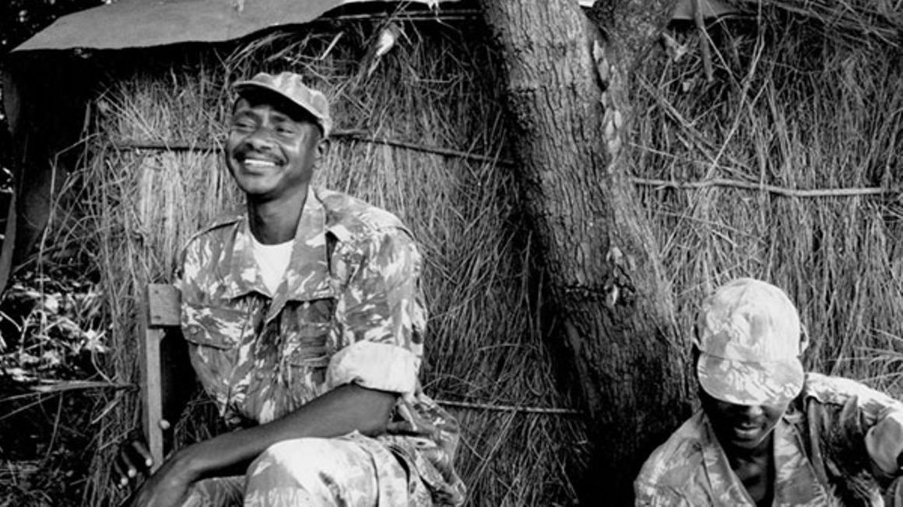
Obote’s cousin, Akena Adoko, wrote a poem in 1983 during the heart of the war which read:
| In the case of Museveni, The passion developed To morbid degree Is one for political power The monomania to rule over others.[6] |
In his thirty-five years in power, Museveni has maintained a one-party state while jailing a record number of journalists—a record that surpasses Idi Amin, the notoriously brutal dictator who ruled from 1971-1979.
Museveni has also passed a harsh anti-gay law and has been accused of killing scores of political opponents.
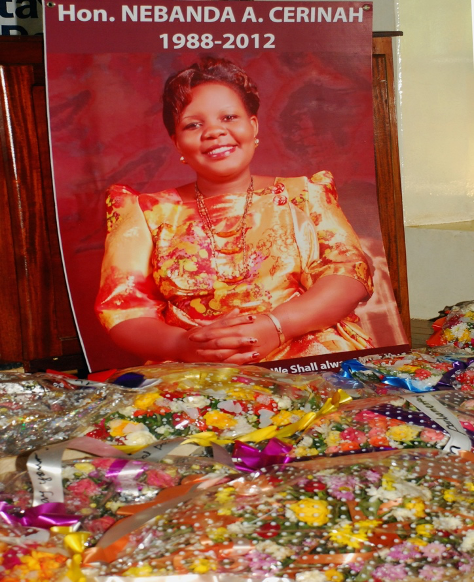
One of these opponents, Cerinah Nebanda, had helped build three secondary schools in her district as a member of parliament, bought a boat for people stranded during the rainy season, and helped out countless villagers with school fees and medicine.
After Nebanda began speaking out about Museveni’s corruption, she was poisoned. The Ugandan police claimed she died of a drug overdose but Nebanda had never used drugs and was as clean-cut as they come.[7]
David Sejusa, the former head of the Ugandan intelligence agency, told an online magazine that Nebanda, along with many other prominent Ugandans who died from mysterious illnesses or in sudden accidents, had been “killed on orders from on high”—meaning at the direction of President Museveni.[8]
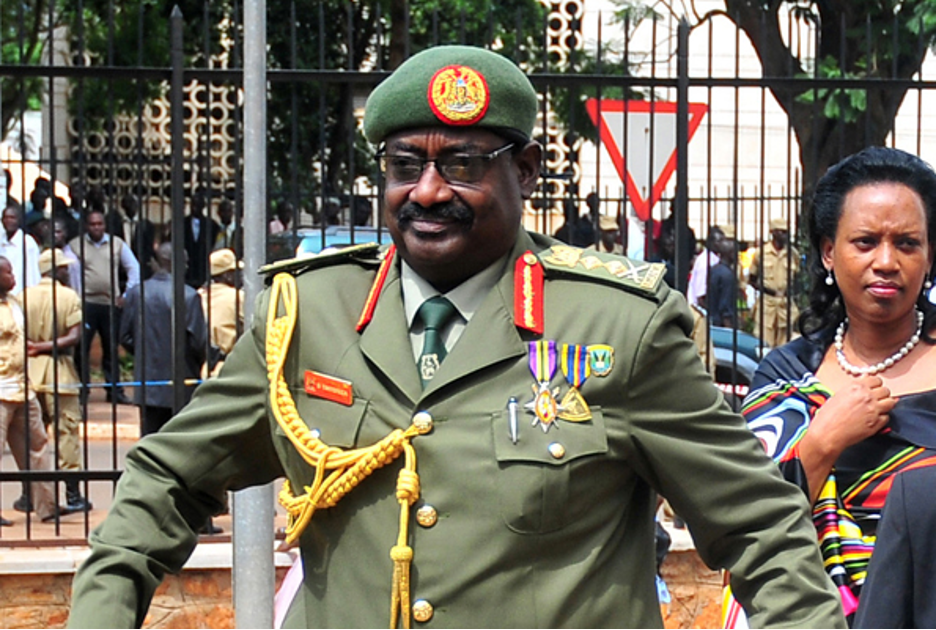
Frances Ayume, the Attorney General who tried to block Museveni’s extension of presidential term limits in 2004, died in a mysterious car crash in which it was claimed that his car hit a pothole in the middle of the night which was miraculously filled by morning![9] Locals said later, however, that Ayume had been shot.
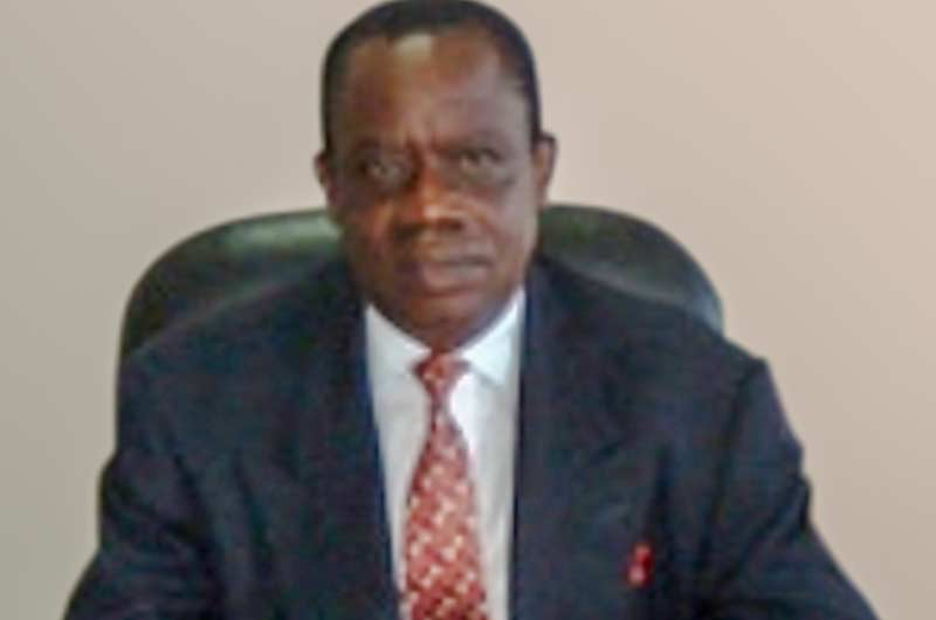
In 2011, Ugandan security forces opened fire on demonstrators who had taken to the streets to protest government corruption and economic mismanagement, killing at least nine people.
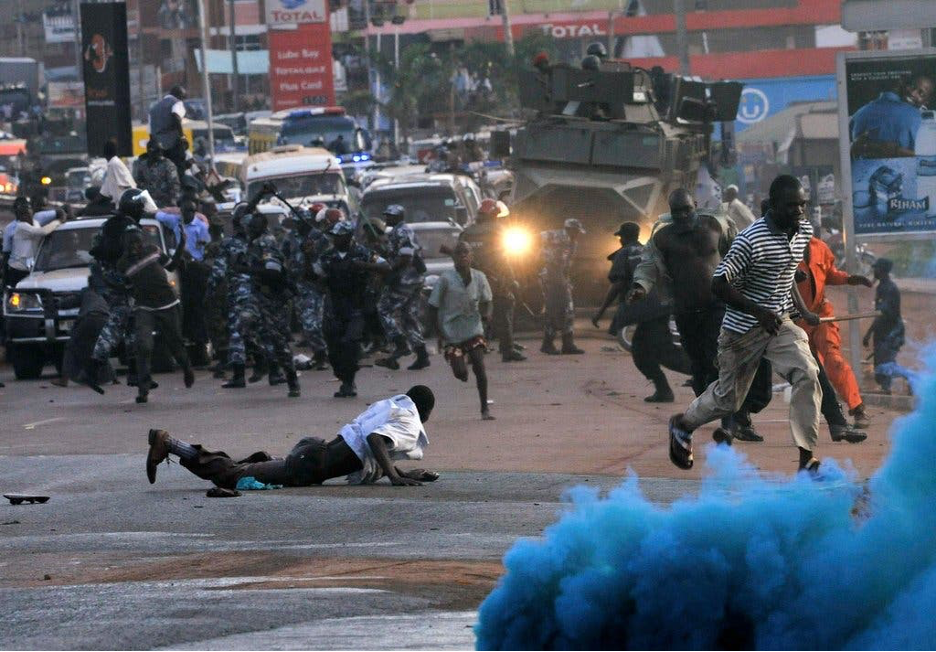
Then, in 2016, the Ugandan army slaughtered 150 unarmed people, including at least 15 children, in a western region of the country where relations with the central government were tense.
Plunder of the Congo
Horrific as they were, these latter killings dwarfed those prompted by Uganda’s invasion of the Democratic Republic of Congo (DRC) with Rwanda in 1996 and again in 1998
The goal of the first invasion was to replace the DRC’s ailing leader Joseph Mobutu-Sese Seko with Laurent Kabila, a former guerrilla fighter and diamond smuggler who could help Uganda access the country’s rich mineral wealth.
In 1997, gold and gold compounds plundered from the DRC became Uganda’s second largest source of export earnings.[10]
The next year, after Museveni claimed that Kabila was failing to provide security along Uganda’s border, Ugandan troops invaded the DRC again and helped install a new puppet, Hyppolite Kanambe (AKA Joseph Kabila).[11]
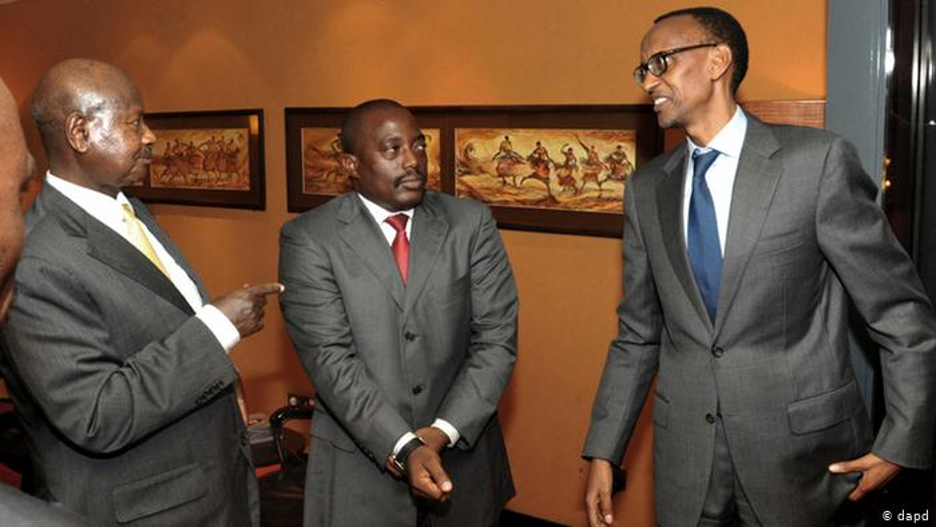
The UN Security Council reported that General James Kazini, the commander of the Ugandan army, looted timber and conspired with a Ugandan militia leader, Wamba dia Waba, to seize 200 tons of coffee beans in the Equateur region.
President Museveni’s half-brother, Salim Saleh, and his wife, Jovia Akandwanaho, took charge of the exploitation of diamonds while setting up a private air transport company to ship illicit natural resources back into Uganda.[12]
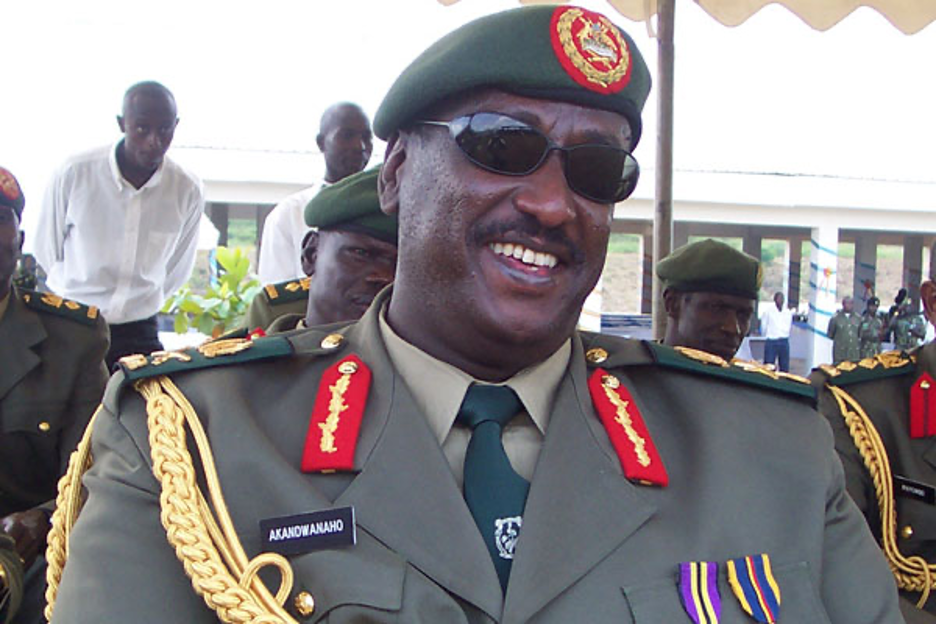
In total, Uganda is estimated to have plundered at least $10 billion in Congo’s mineral wealth.
In December 2005, the international court of justice ordered Uganda to pay reparations for its 1998-2003 invasion which violated Congo’s sovereignty and led to the killing and torture of civilians and destruction of villages.[13]
The ruling did not have any impact on U.S. policy; President George W. Bush gave a speech afterwards lauding Museveni for being “very helpful in solving regional conflicts on the continent of Africa,”—a statement that would have made George Orwell proud.
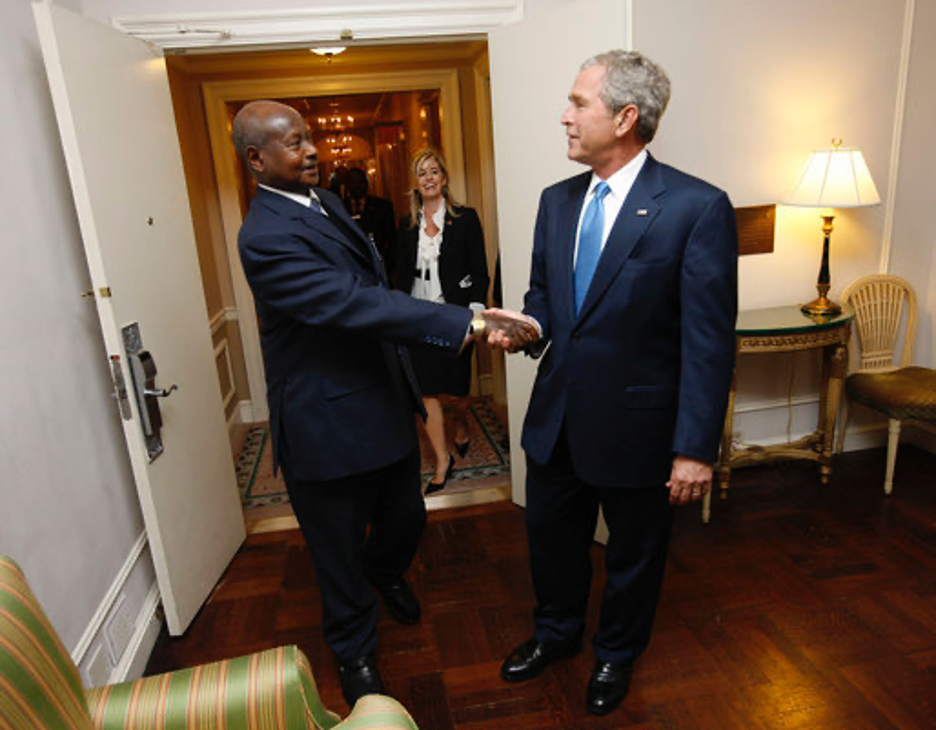
U.S. History of Support for Museveni
American support for Museveni went back to the beginning of his rule.
In October 1987, Museveni was greeted with full honors on Capitol Hill when he visited Washington and met with President Ronald Reagan and Vice-President George H. W. Bush.
Museveni at the time hired a public relations firm owned by Reagan’s son-in-law Dennis Revell to buff up his image, and two years later spent time at Reagan’s ranch.[14]
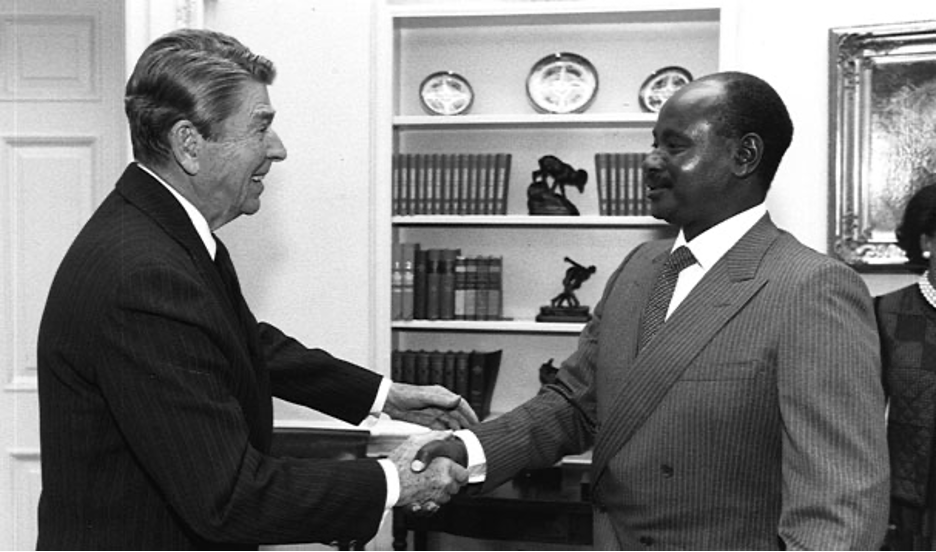
Journalist Helen Epstein wrote that since the meeting with Reagan, Museveni “has had far more contact with high-level American and British officials than any other living African leader.”[15]
Between 1989 and 1992, the Bush administration provided almost $183 million in economic aid to Uganda.
A lot of the money was illegally funneled to the Rwandan Patriotic Front (RPF), Tutsi-exiles backed by the CIA. They carried out an illegal invasion of Rwanda from Ugandan territory in October 1990, with the goal of unseating the Hutu-led government of Juvenal Habyarimana, supported by France.[16]
The U.S. backed invasion resulted in a civil war that culminated in the 1994 Rwandan genocide and Congo wars.
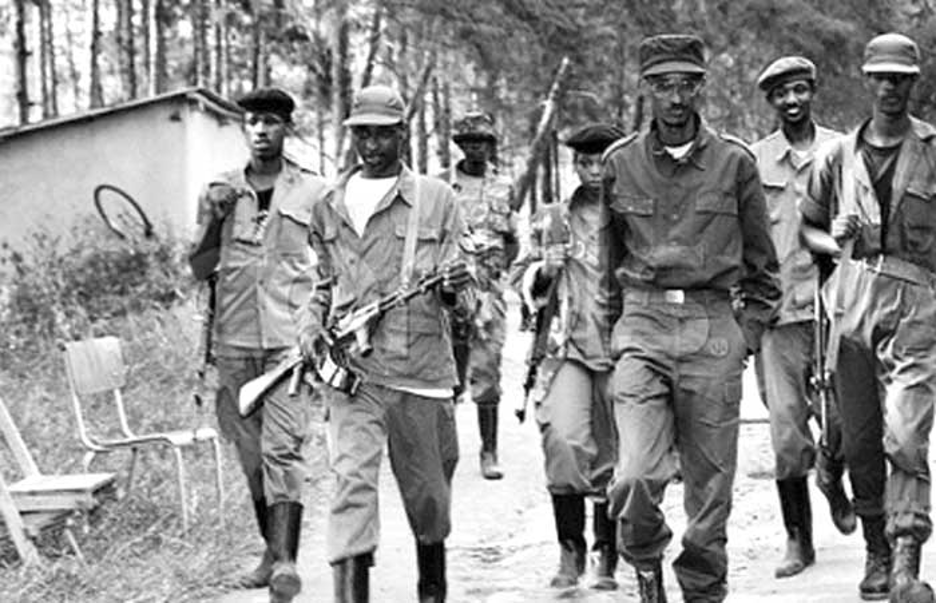
During George H. W. Bush’s last year in office, the White House asked Congress for a 33 percent increase in the International Military Education and Training (IMET) budget of $200,000 to train Museveni’s officers, primarily Rwandan Tutsis in Museveni’s army.[17]
In September 1992, a personal assistant to Museveni was apprehended by U.S. Customs trying to procure 400 U.S. TOW missiles and 34 launchers, which were being obtained for the RPF in violation of a UN arms embargo.
The Justice Department later dropped the case after being pressured by Clinton’s State Department, suggesting the operation was overseen by the Pentagon or CIA.[18]
In March 1998, President Clinton chose Kampala symbolically as the site for an African summit, where he praised Museveni as the leader of a “new generation of African leaders” supposedly committed to free-markets and democracy.
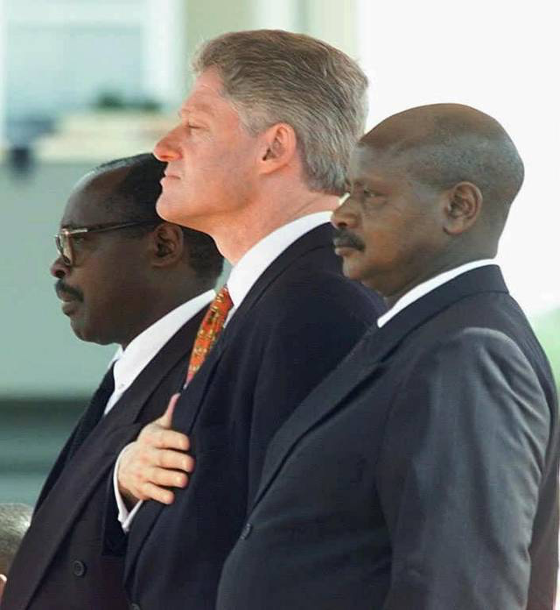
The New York Times reported at the time that Museveni’s “style of self-reliant government, fiscal discipline and free-market economics has made him the darling of United States diplomats, who are trying to remold America’s role in Africa to replace costly and paternalistic aid programs with more trade and investment.”
The U.S. diplomats were unbothered by Uganda’s involvement at the time in the Congo and its invasion of the oil-rich South Sudan as part of a policy that aimed to break up the Sudan and undermine its northern leader, Omar Bashir, who allied with China.
The strategy of “fiscal discipline and free-market economics” further has left Uganda as one of the poorest countries in the world, which has earned more money from the export of mercenaries then from its staple crop, coffee.[19]
The Washington Post reported that most U.S. aid money in the last few years has gone towards health programs and training and equipping the Ugandan military, which besides fighting in South Sudan, has supplied the largest contingent of soldiers to fight against al-Shabab in Somalia.
In 2011, the Obama administration deployed 150 Special Forces and provided tilt rotor aircraft and surveillance drones as part of a $780 million package to Museveni’s government to hunt for Joseph Kony, a warlord accused of abducting thousands of child soldiers.
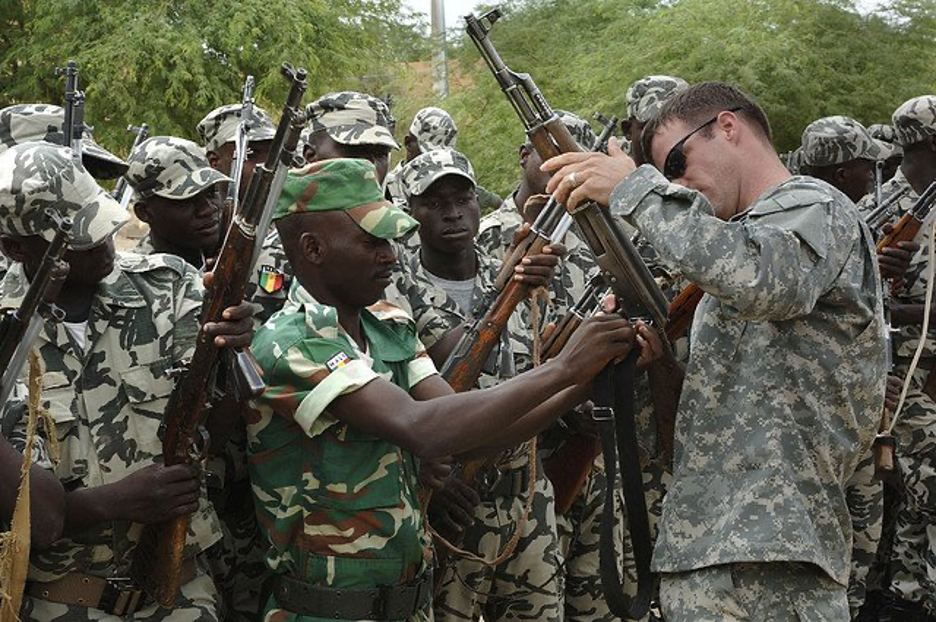
Political scientist Adam Branch details in Displacing Human Rights: War and Intervention in Northern Uganda how the northern-based Acholi people from where Kony sprang had backed the regime of Milton Obote and were in turn assaulted by Museveni’s army.
According one bishop, the latter “behaved worse towards the Acholi than Idi Amin.” Villages were shelled, cattle stolen, civilians burnt alive, shot and deliberately infected with HIV. Over a million civilians were driven into displaced person camps which held the highest mortality rates of anywhere in the world.
Comparing the Acholi people to “insects” and “swine,” Museveni has used the war against Kony to punish his old adversaries and control Northern Uganda which sits atop oil and gold.
Thwarting peace efforts numerous times, Museveni maintained a crisis environment that enabled the government to “justify measures that would be unacceptable in different circumstances” and allowed it to “silence political dissidents, including vocal members of the Acholi population accused of being “friends of the terrorists.”
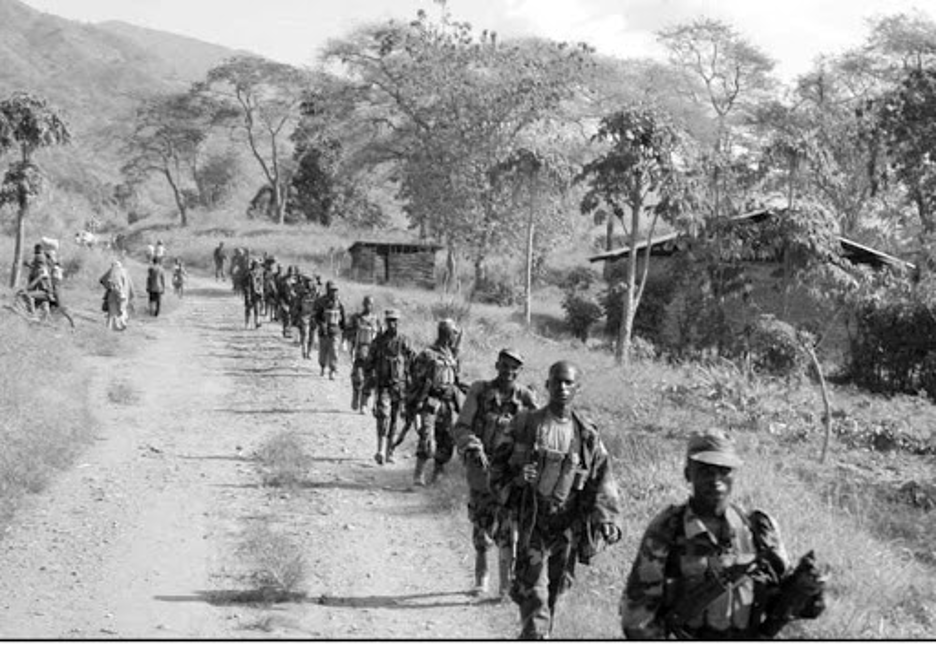
American Special Forces were deployed from military bases in Entebbe and Obo in Central Africa (CAR), as well as in Dungu in Eastern Congo and South Nzara in South Sudan, bases whose existence were all justified by the campaign.[20]
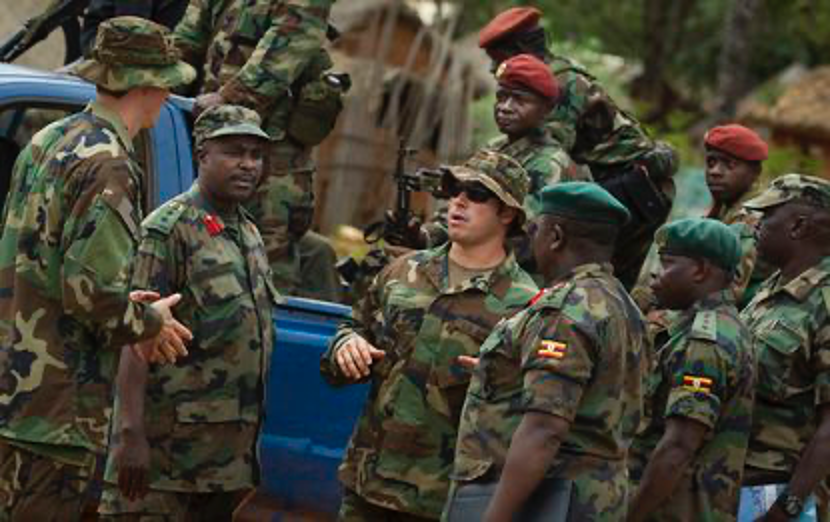
Conclusion
In their classic 1979 book, The Political Economy of Human Rights: The Washington Connection and Third World Fascism, Noam Chomsky and Edward S. Herman emphasize how American support for right-wing leaders like Museveni has historically been rooted in the search for favorable investment climates and opportunities for U.S. businesses.[21]
In 2018/2019, foreign direct investment in Uganda totaled $1.75 billion, driven by Museveni’s neoliberal policies.
Major U.S. firms operating in Uganda include: Citibank; Prudential; AIG; Caterpillar; John Deere; NCR; Sheraton; Marriott; FedEx, Ernst & Young, Deloitte; Price Waterhouse Coopers; General Motors; Coca-Cola; Pepsi-Cola; and American Tower Corporation.
Uganda is thought to have some of the largest oil reserves in Africa.

Museveni furthermore has helped open up opportunities for U.S. businesses in the mining sector through his invasions of Congo, which were supported by the United States.
Despite some statements about election fraud by the State Department, the incoming Biden administration is unlikely to diminish U.S. ties to Uganda and cut off the spigots.
Museveni’s value has been enhanced by growing geopolitical rivalry with China, which has made significant inroads into Africa as part of a new inter-imperialist rivalry.
China invested $607 million in Uganda in 2018.2019, and has pledged to help build a railway connecting Uganda with Kenya.
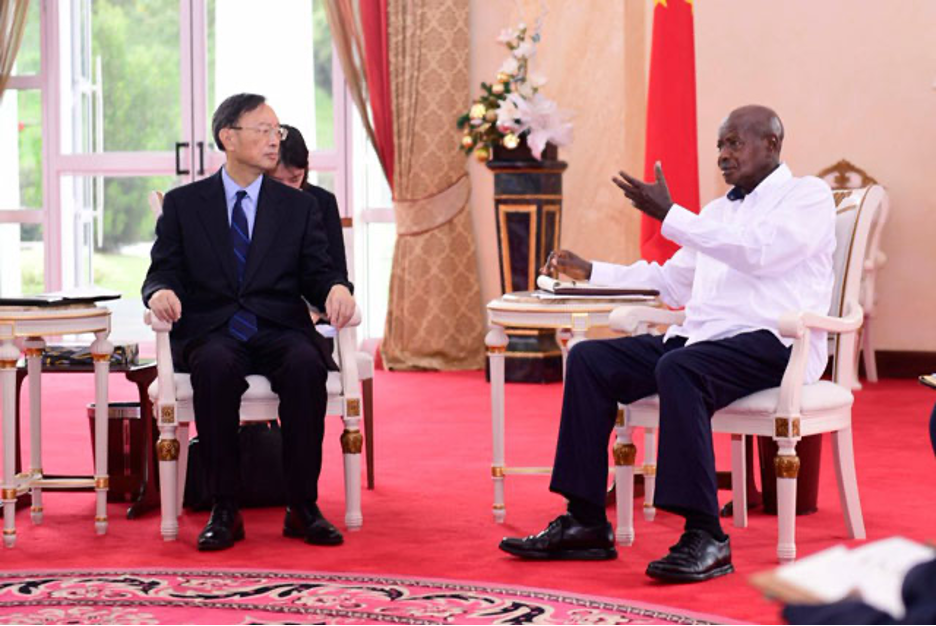
This gives incentive for the United States to try and extend its support for Uganda’s dictator in order to keep pace.

[1] A report seen by the New York Times which had input from 2,000 election observers from 14 districts nationwide found late openings in most polling stations, incidents of illegally opened ballot boxes, and the arrest of 26 members of civil society groups who were observing the election.
[2] The European Union also released a statement saying that the electoral process had been seriously tarnished.
[3] Helen Epstein, Another Fine Mess: Americas, Uganda, and the War on Terror (New York: Columbia Global Reports, 2017), 61. Epstein suggests that Museveni did field work in Mozambique and wrote about the allegedly empowering effects on peasants of gazing upon the severed heads of Portuguese soldiers.
[4] Epstein, Another Fine Mess, 61, 62.
[5] Epstein, Another Fine Mess, 65.
[6] Quoted in Epstein, Another Fine Mess, 60.
[7] Epstein, Another Fine Mess, 181, 184, 185, 187.
[8] Epstein, Another Fine Mess, 182.
[9] Epstein, Another Fine Mess, 187.
[10] John F. Clark, “Museveni’s Adventure in the Congo War: Uganda’s Vietnam? In The African Stakes of the Congo War, ed. John F. Clark (New York: McMillan, 2002), 152.
[11] Yaa-Lengi M. Ngemi, ‘Joseph Kabila’: Identity Thief, Imposter and Rwandan Trojan Horse in Congo (New York: 2017).
[12] Clark, “Museveni’s Adventure in the Congo War,” in The African Stakes of the Congo War, ed. Clark, 157.
[13] Museveni so far has refused to make any reparations payments.
[14] Epstein, Another Fine Mess, 71.
[15] Epstein, Another Fine Mess, 33.
[16] Harald Marwitz, “Another Side of Rwanda’s Bloodbath,” Washington Times, August 11, 1994, A12; Barry Crawford, “From Arusha to Goma: How the West Started the War in Rwanda,” Africa Direct, February 17, 1995; Remegius Kintu, “The Truth Behind the Rwandan Tragedy,” Presented to UN Tribunal on Rwanda, Arusha, Tanzania, March 20, 2005, file:///C:/Users/jeremykuzmarov/AppData/Local/Packages/Microsoft.MicrosoftEdge_8wekyb3d8bbwe/TempState/Downloads/3588%20(1).pdEpstein, Another Fine Mess, 106.
[17] Wayne Madsen, Genocide and Covert Operations in Africa 1993-1999 (Lewiston, NY: Edwin Mellen Press, 1999), 42, 105.
[18] Marwitz, “Another Side of Rwanda’s Bloodbath;” Madsen, Genocide and Covert Operations in Africa 1993-1999, 41, 42.
[19] Jeremy Kuzmarov, Obama’s Unending Wars: Fronting the Foreign Policy of the Permanent Warfare State (Atlanta: Clarity Press, 2019), 96.
[20] Kuzmarov, Obama’s Unending Wars, 96, 97.
[21] Museveni fits the category of what Chomsky and Herman define as “sub-fascist” leaders. They lack the charisma of a Hitler or Mussolini to stir the masses and rule more on patronage, while cracking-down on dissent violently and promoting military aggression.
CovertAction Magazine is made possible by subscriptions, orders and donations from readers like you.
Blow the Whistle on U.S. Imperialism
Click the whistle and donate
When you donate to CovertAction Magazine, you are supporting investigative journalism. Your contributions go directly to supporting the development, production, editing, and dissemination of the Magazine.
CovertAction Magazine does not receive corporate or government sponsorship. Yet, we hold a steadfast commitment to providing compensation for writers, editorial and technical support. Your support helps facilitate this compensation as well as increase the caliber of this work.
Please make a donation by clicking on the donate logo above and enter the amount and your credit or debit card information.
CovertAction Institute, Inc. (CAI) is a 501(c)(3) non-profit organization and your gift is tax-deductible for federal income purposes. CAI’s tax-exempt ID number is 87-2461683.
We sincerely thank you for your support.
Disclaimer: The contents of this article are the sole responsibility of the author(s). CovertAction Institute, Inc. (CAI), including its Board of Directors (BD), Editorial Board (EB), Advisory Board (AB), staff, volunteers and its projects (including CovertAction Magazine) are not responsible for any inaccurate or incorrect statement in this article. This article also does not necessarily represent the views the BD, the EB, the AB, staff, volunteers, or any members of its projects.
Differing viewpoints: CAM publishes articles with differing viewpoints in an effort to nurture vibrant debate and thoughtful critical analysis. Feel free to comment on the articles in the comment section and/or send your letters to the Editors, which we will publish in the Letters column.
Copyrighted Material: This web site may contain copyrighted material the use of which has not always been specifically authorized by the copyright owner. As a not-for-profit charitable organization incorporated in the State of New York, we are making such material available in an effort to advance the understanding of humanity’s problems and hopefully to help find solutions for those problems. We believe this constitutes a ‘fair use’ of any such copyrighted material as provided for in section 107 of the US Copyright Law. You can read more about ‘fair use’ and US Copyright Law at the Legal Information Institute of Cornell Law School.
Republishing: CovertAction Magazine (CAM) grants permission to cross-post CAM articles on not-for-profit community internet sites as long as the source is acknowledged together with a hyperlink to the original CovertAction Magazine article. Also, kindly let us know at info@CovertActionMagazine.com. For publication of CAM articles in print or other forms including commercial internet sites, contact: info@CovertActionMagazine.com.
By using this site, you agree to these terms above.
About the Author

Chris Agee
Executive Editor
Jeremy Kuzmarov
Managing Editor
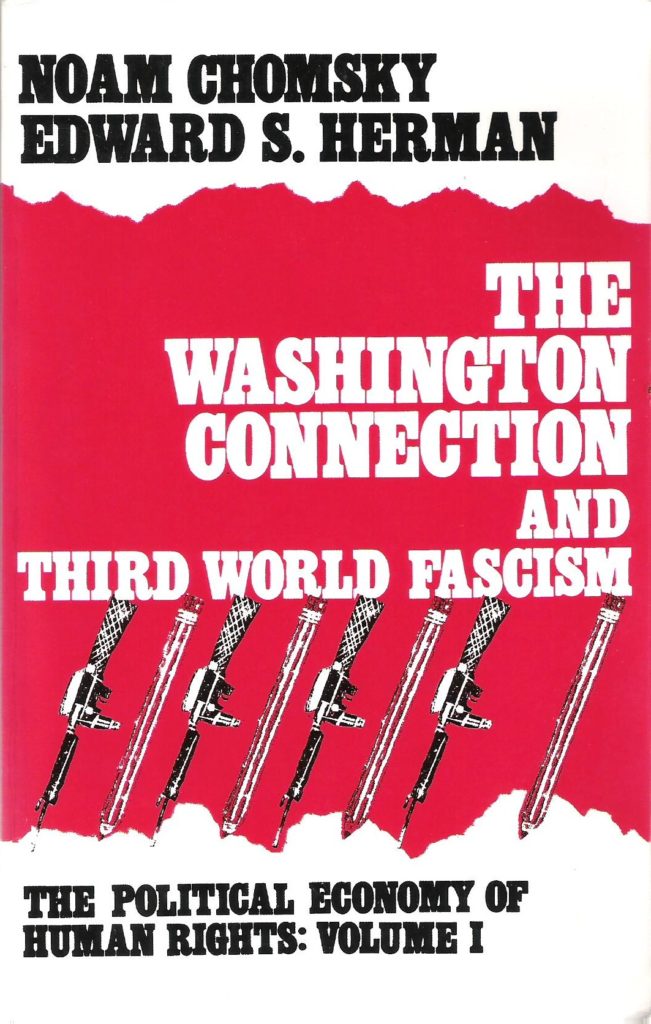

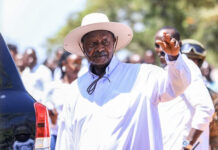
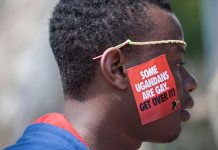
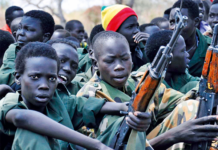

U.S. Assistance to Uganda
The United States provides significant development and security assistance to Uganda, with a total assistance budget exceeding $970 million per year. The U.S. government plays a key role in supporting the professionalization of the military; providing anti-retroviral treatment for more than 990,000 HIV-positive Ugandans; and working to boost economic growth and agricultural productivity, improve educational and health outcomes, and support democratic governance through inclusive, accountable institutions. The U.S. mission is working with the Government of Uganda to improve tax collection and oil revenue management, and to increase Uganda’s domestic funding for public services and the national response to HIV/AIDS.